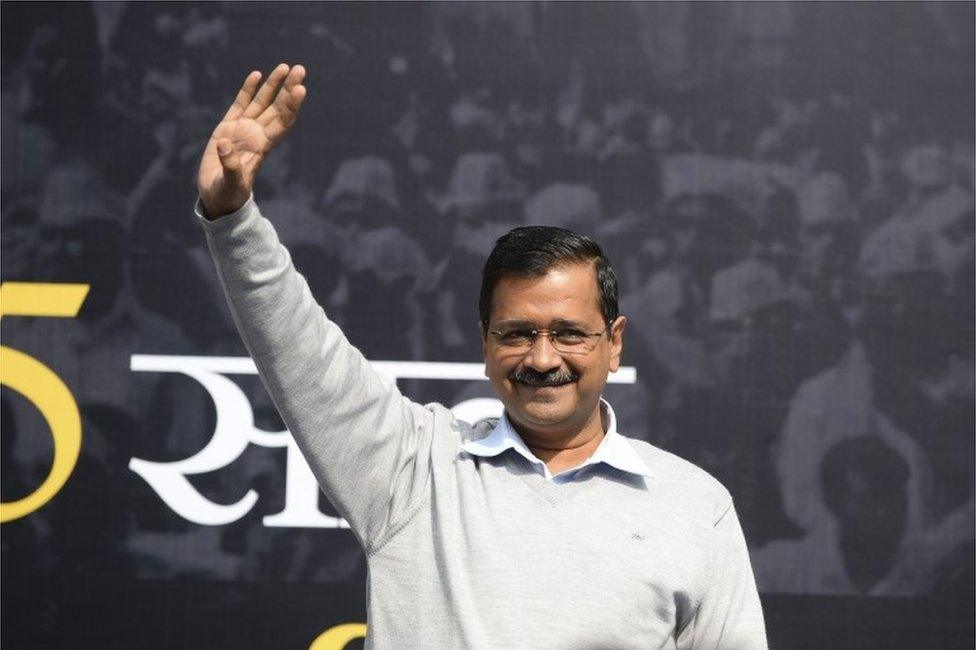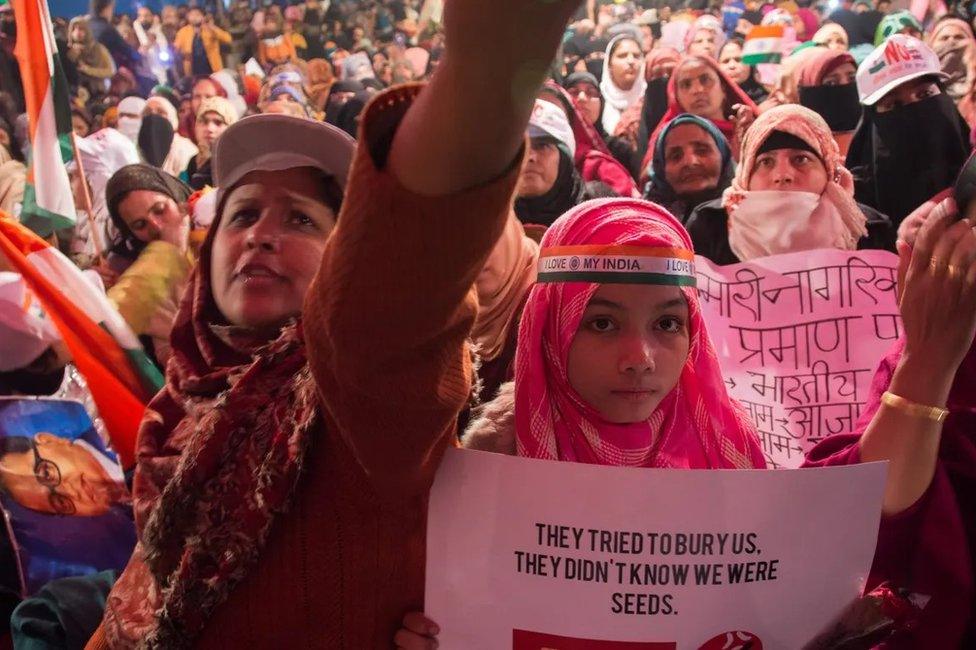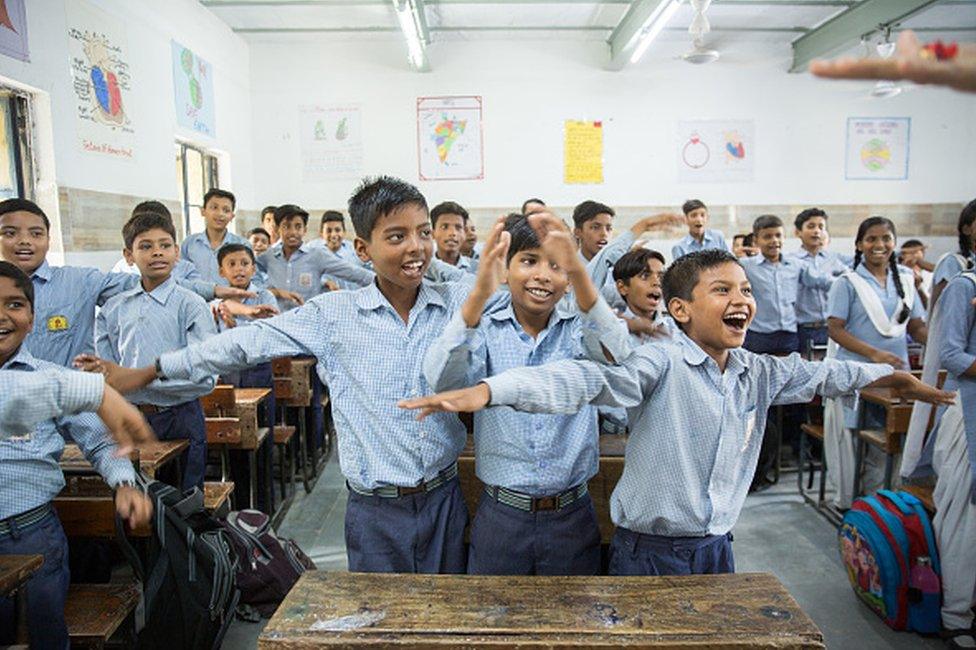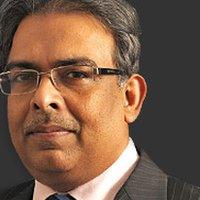Delhi election: Is the verdict a vote against Narendra Modi?
- Published

Mr Kejriwal's comfortable win owes more to the triumph of welfarism
Arvind Kejriwal's Aam Aadmi Party (AAP) has swept back to power for a third term in a row in India's capital Delhi. But it would be misleading to read this verdict as a vote against Prime Minister Narendra Modi. Here's why.
Rather than being seen as a vote against the BJP, Mr Kejriwal's comfortable win owes more to the triumph of welfarism and effective governance - revamping state-run schools and health clinics, and providing cheap water and electricity.
The BJP has been out of power in Delhi for more than two decades, and it was up against a party which had delivered on its promises. In the early days of the campaign, it tried to puncture Mr Kejriwal's claims of good governance without success. Mr Modi's party then embarked on a coarse and polarising campaign around a controversial new citizenship law, the stripping of Kashmir's autonomy and building a grand new Hindu temple. Party leaders freely indulged in hate speech and were censured by poll authorities: a junior minister actually egged on a campaign meeting to shout slogans about "gunning down traitors", a not-so veiled reference to political rivals.
Mr Modi's party possibly felt this would work. At the very least, the take-no-prisoners campaign would prevent a debacle in Delhi - like in 2015, when the BJP won just three seats. After all, a similar hardline campaign had helped the BJP sweep all seven Delhi seats in last year's general election, and pick up more than half of the popular vote.
But that didn't work this time.

The BJP targeted Muslim protesters in Shaheen Bagh on the campaign trail
So, was the verdict a rejection of the BJP's polarising politics? The answer is perhaps more nuanced. There's ample evidence to show that fervent supporters of Mr Modi and his policies can vote for a different party in their state if they feel that party has improved their lives.
A pre-election survey by the Centre for the Study of Developing Societies (CSDS), a respected Delhi-based think tank, also found that roughly 70% of the city respondents support Mr Modi's controversial citizenship law and oppose the protests against the law. One of the protests - by women in Shaheen Bagh, a Muslim-dominated neighbourhood in Delhi - was especially targeted by the BJP's campaign, which sought to show the protesters as "traitors". Before the general elections in 2019, when the BJP trounced Mr Kejriwal's party in Delhi, a large number of supporters who voted for Mr Modi said they preferred Mr Kejriwal as the chief minister and might vote for the AAP in the Delhi polls.

Read more from Soutik Biswas:

"In Delhi, people have approved of the work done by Mr Kejriwal's government. It has nothing to do with [the] citizenship law or the countrywide protests against it or policies of the BJP," political scientist Sanjay Kumar of the CSDS told me. "This is really not indicative of a national mood against Mr Modi and the BJP."
Also, research by political scientists Rahul Verma and Pranav Gupta shows that when it comes to Delhi, the BJP has always gained impressively in general elections - 46% of the popular vote in 2014 and 56% of the vote in 2019. But it then slid back to its "core base" - some 32% of the vote - in state elections. The fact that the once-dominant Congress party has been eclipsed might also have helped Mr Kejriwal's party grow.
Put simply, what is happening in India today is that voters are making a distinction between state and federal elections. Barely six months after sweeping the general elections in the eastern state of Jharkhand last year, the BJP lost the state elections, with its vote share dropping by more than 17%.

Mr Kejriwal is credited with revamping Delhi's government-run schools
The party faced a similar predicament in Haryana and Maharashtra states, where it failed to repeat its performance in the general election, cobbling together a government in Haryana, but failing to form one in Maharashtra. Clearly, even discerning supporters of the BJP, according to political scientist Suhas Palshikar, are "willing to switch to state parties during state elections". Yogendra Yadav of Swaraj Abhiyan, calls it "ticket splitting" - a sign, he says, of "voters' sophistication". State battles, he adds, are "not [a] substitute for taking on the Modi regime at the level of national politics".
It's also becoming increasingly clear that Mr Modi's BJP and its belligerent politics can be countered in India's states. But in order to do so, popular local governments need a credible leader who seeks votes on governance, and not by countering BJP's Hindu nationalist plank. In other words, opposition parties have begun to fear - some of the fear is possibly imagined - that fighting the BJP on its pro-Hindu agenda could invite a backlash from the majority community. In Delhi, Mr Kejriwal astutely stood his ground on his record in government and refused to engage with the BJP's ideological campaign. He even refrained from attacking Mr Modi personally.
Will the Delhi election have a larger impact and hurt the BJP's prospects?
There is no clear evidence yet. Many believe the BJP's "single-track" muscular nationalist campaign is creating a climate of anxiety, insecurity and exhaustion at a time when India is actually a secure nation. They say this brand of stridently nationalist politics draws attention away from the serious economic slowdown in the country. But what's clear is that Mr Modi remains India's most popular leader and his base is still largely intact.
What Mr Kejriwal's victory does is offer a breather to a largely divided and demoralised opposition - and it proves that good governance wins votes.
